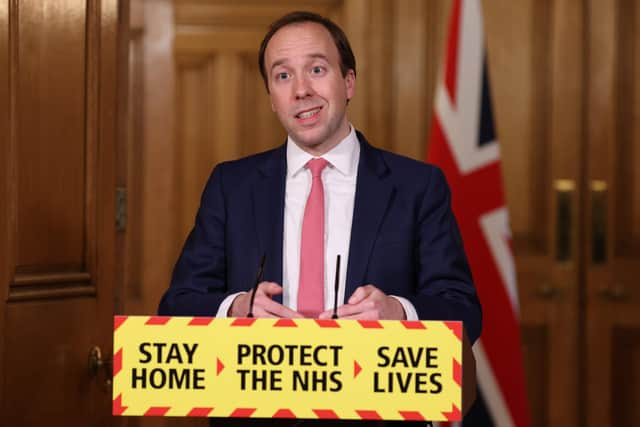Single dose of Oxford or Pfizer vaccine can reduce hospital admissions from coronavirus by 80 per cent in vulnerable groups
Public Health England today revealed the new data which showed even one dose of vaccine had dramatically reduced hospitalisations and deaths from coronavirus in some of the most vulnerable groups.
And the Health Secretary said it was “extremely good news”.
Mr Hancock told a Downing Street press conference the data showed that “a single shot of either the Oxford/AstraZeneca vaccine or of the Pfizer vaccine works against severe infection among the over-70s with a more than 80 per cent reduction in hospitalisations”.


Advertisement
Hide AdAdvertisement
Hide AdAnd he said the results “may also help to explain why the number of Covid admissions to intensive care units among people over 80 in the UK have dropped to single figures in the last couple of weeks”.
The study, which has yet to be peer-reviewed, included more than 7.5m people aged 70 and over in England.
The number of admissions to hospital was falling faster than the number of cases, Mr Hancock said, especially among those groups vaccinated first, and he said: “This is a sign that the vaccine is working.”
There was an even clearer sign in the data on deaths, with the rate of decline in the older groups faster than in the under-80s, and Mr Hancock added: “This shows, in the real world , across the UK right now that the vaccine is helping both to protect the NHS and to save lives.”
Advertisement
Hide AdAdvertisement
Hide AdWhile England’s Deputy Chief Medical Officer Professor Jonathan Van-Tam added that data for the Pfizer vaccine shows the likelihood of mortality is reduced by 85 per cent in over-70s.
He said the data “gives us those first glimpses of how, if we are patient, and we give this vaccine programme time to have its full effect, it is going to hopefully take us into a very different world in the next few months”.
Encouraging people to continue to come forward for their first and second doses, he added: “We have to be patient. We have to push on with the vaccine programme.”
In Yorkshire and the North East 2,664,708 people have now had their first vaccine dose, and 98,914 second doses have been delivered.
Advertisement
Hide AdAdvertisement
Hide AdBut Mr Hancock warned the public to “keep sticking to the rules, let’s not blow it now”.
It comes as a further 104 deaths were recorded across the UK within 28 days of a positive Covid test, bringing the country’s total to 122,953. However that was the lowest daily figure since October 26, when there were 102 deaths.
Prof Van-Tam said the latest scientific data had “vindicated” the UK’s decision to give the AstraZeneca vaccine to older people. Some countries have refused to administer the vaccine to the over-65s because of a lack of testing data on older age groups.
But Prof Van-Tam said the Joint Committee on Vaccination and Immunisation had taken the view that it was “not immunologically plausible” the vaccine would work in younger age groups but not older ones.
Advertisement
Hide AdAdvertisement
Hide Ad“We took a view that it almost certainly would work. The PHE (Public Health England) data have clearly vindicated that approach today,” he said.
“I am not here to criticise other countries but to say that I think in time the data emerging from our programme will speak for itself and other countries will doubtless be very interested in it.”
And he stressed the importance of having the second dose of the vaccine.
“I think there’s quite a significant likelihood that a second dose of vaccine is going to mature your immune response, possibly make it broader and almost certainly make it longer than it would otherwise be in relation to a first dose only,” he said.
That meant it was “absolutely critical” that second doses “are still part of the course of immunisation against Covid-19 and no less important for that reason”.